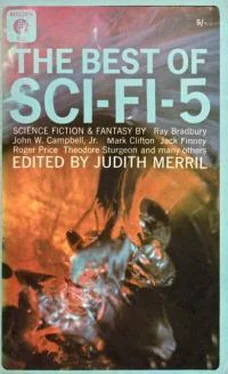The Best of Sci-Fi-5
Здесь есть возможность читать онлайн «The Best of Sci-Fi-5» весь текст электронной книги совершенно бесплатно (целиком полную версию без сокращений). В некоторых случаях можно слушать аудио, скачать через торрент в формате fb2 и присутствует краткое содержание. Год выпуска: 1966, Издательство: Mayflower-Dell, Жанр: Фантастика и фэнтези, на английском языке. Описание произведения, (предисловие) а так же отзывы посетителей доступны на портале библиотеки ЛибКат.
- Название:The Best of Sci-Fi-5
- Автор:
- Издательство:Mayflower-Dell
- Жанр:
- Год:1966
- ISBN:нет данных
- Рейтинг книги:3 / 5. Голосов: 1
-
Избранное:Добавить в избранное
- Отзывы:
-
Ваша оценка:
- 60
- 1
- 2
- 3
- 4
- 5
The Best of Sci-Fi-5: краткое содержание, описание и аннотация
Предлагаем к чтению аннотацию, описание, краткое содержание или предисловие (зависит от того, что написал сам автор книги «The Best of Sci-Fi-5»). Если вы не нашли необходимую информацию о книге — напишите в комментариях, мы постараемся отыскать её.
The Best of Sci-Fi-5 — читать онлайн бесплатно полную книгу (весь текст) целиком
Ниже представлен текст книги, разбитый по страницам. Система сохранения места последней прочитанной страницы, позволяет с удобством читать онлайн бесплатно книгу «The Best of Sci-Fi-5», без необходимости каждый раз заново искать на чём Вы остановились. Поставьте закладку, и сможете в любой момент перейти на страницу, на которой закончили чтение.
Интервал:
Закладка:
He closed his hand upon it and the happiness stayed on - and it was all wrong, for there was not a single reason that he should be happy. The critter finally had left him and his money was all gone and he had no friends, but still he kept on feeling good.
He put the ball into his pocket and stepped spryly for the house to get the milking pails. He pursed up his whiskered lips and began to whistle and it had been a long, long time since he had even thought to whistle.
Maybe he was happy, he told himself, because the critter had not left without stopping to take his hand and try to say good-by.
And a gift, no matter how worthless it might be, how cheap a trinket, still had a basic value in simple sentiment. It had been many years since anyone had bothered to give him a gift.
It was dark and lonely and unending in the depths of space with no Companion. It might be long before another was obtainable.
It perhaps was a foolish thing to do, but the old creature had been such a kind savage, so fumbling and so pitiful and eager to help. And one who travels far and fast must likewise travel light. There had been nothing else to give.
MARIANA
by Fritz Leiber
from Fantastic
The first definite and absolutely unchangeable selection I made for this edition of SF was Fritz Leiber’s story, “The Silver Eggheads,” from Fantasy and Science Fiction.
That was in January of ‘59. For some sixteen months since, F&SF has remained incurably readable. In the same period of time, Leiber has been turning out stories, and yet better stories, at such a rate that Fantastic broke every rule in the business and published one complete all-Leiber issue last November.
The arithmetic of anthology selection, in such a case, is evident, and so is the usual lady’s prerogative. But I mourn for the “Eggheads,” and urge you all to storm your back-number magazine stores for it.
And one more thing (that’s the other prerogative, no?)— We’re all going to have to slop saying scornfully, “I mean good science fiction—not that Buck Rogers stuff!” Leiber it writing the Buck Rogers comic strip now… .
Mariana had been living in the big villa and hating the tall pine trees around it for what seemed like an eternity when she found the secret panel in the master control panel of the house.
The secret panel was simply a narrow blank of aluminum—she’d thought of it as room for more switches if they ever needed any, perish the thought!—between the air-conditioning controls and the gravity controls. Above the switches for the three-dimensional TV but below those for the robot butler and maids.
Jonathan had told her not to fool with the master control panel while he was in the city, because she would wreck anything electrical, so when the secret panel came loose under her aimlessly questing fingers and fell to the solid rock floor of the patio with a musical twing her first reaction was fear.
Then she saw it was only a small blank oblong of sheet aluminum that had fallen and that in the space it had covered was a column of six little switches. Only the top one was identified. Tiny glowing letters beside it spelled trees and it was on.
When Jonathan got home from the city that evening she gathered her courage and told him about it. He was neither particularly angry nor impressed.
“Of course there’s a switch for the trees,” he informed her deflatingly, motioning the robot butler to cut his steak. “Didn’t you know they were radio trees? I didn’t want to wait twenty-five years for them and they couldn’t grow in this rock anyway. A station in the city broadcasts a master pine tree and sets like ours pick it up and project it around homes. It’s vulgar but convenient.” ‘
After a bit she asked timidly, “Jonathan, are the radio pine trees ghostly as you drive through them?”
“Of course not! They’re solid as this house and the rock under it—to the eye and to the touch too. A person could even climb them. If you ever stirred outside you’d know these things. The city station transmits pulses of alternating matter at sixty cycles a second. The science of it is over your head.”
She ventured one more question: “Why did they have the tree switch covered up?”
“So you wouldn’t monkey with it—same as the fine controls on the TV. And so you wouldn’t get ideas and start changing the trees. It would unsettle me , let me tell you, to come home to oaks one day and birches the next. I like consistency and I like pines.” He looked at them out of the dining-room picture window and grunted with satisfaction.
She had been meaning to tell him about hating the pines, but that discouraged her and she dropped the topic.
About noon the next day, however, she went to the secret panel and switched off the pine trees and quickly turned around to watch them.
At first nothing happened and she was beginning to think that Jonathan was wrong again, as he so often was though would never admit, but then they began to waver and specks of pale green light churned across them and then they faded and were gone, leaving behind only an intolerably bright single point of light—just as when the TV is switched off. The star hovered motionless for what seemed a long time, then backed away and raced off toward the horizon.
Now that the pine trees were out of the way Mariana could see the real landscape. It was flat gray rock, endless miles of it, exactly the same as the rock on which the house was set and which formed the floor of the patio. It was the same in every direction. One black two-lane road drove straight across it—nothing more.
She disliked the view almost at once—it was dreadfully lonely and depressing. She switched the gravity to moon-normal and danced about dreamily, floating over the middle-of-the-room bookshelves and the grand piano and even having the robot maids dance with her, but it did not cheer her. About two o’clock she went to switch on the pine trees again, as she had intended to do in any case before Jonathan came home and was furious.
However, she found there had been changes in the column of six little switches. The trees switch no longer had its glowing name. She remembered that it had been the top one, but the top one would not turn on again. She tried to force it from “off” to “on” but it would not move.
All the rest of the afternoon she sat on the steps outside the front door watching the black two-lane road. Never a car or a person came into view until Jonathan’s tan roadster appeared, seeming at first to hang motionless in the distance and then to move only like a microscopic snail although she knew he always drove at top speed—it was one of the reasons she would never get in the car with him.
Jonathan was not as furious as she had feared. “Your own damn fault for meddling with it,” he said curtly. “Now we’ll have to get a man out here. Dammit, I hate to eat supper looking at nothing but those rocks! Bad enough driving through them twice a day.”
She asked him haltingly about the barrenness of the landscape and the absence of neighbors.
“Well, you wanted to live way out ,” he told her. “You wouldn’t ever have known about it if you hadn’t turned off the trees.”
“There’s one other thing I’ve got to bother you with, Jonathan,” she said. “Now the second switch—the one next below—has got a name that glows. It just says house. It’s turned on—I haven’t touched it! Do you suppose…”
“I want to look at this,” he said, bounding up from the couch and slamming his martini-on-the-rocks tumbler down on the tray of the robot maid so that she rattled. “I bought this house as solid, but there are swindles. Ordinarily I’d spot a broadcast style in a flash, but they just might have slipped me a job relayed from some other planet or solar system. Fine thing if me and fifty other multi-megabuck men were spotted around in identical houses, each thinking his was unique.”
Читать дальшеИнтервал:
Закладка:
Похожие книги на «The Best of Sci-Fi-5»
Представляем Вашему вниманию похожие книги на «The Best of Sci-Fi-5» списком для выбора. Мы отобрали схожую по названию и смыслу литературу в надежде предоставить читателям больше вариантов отыскать новые, интересные, ещё непрочитанные произведения.
Обсуждение, отзывы о книге «The Best of Sci-Fi-5» и просто собственные мнения читателей. Оставьте ваши комментарии, напишите, что Вы думаете о произведении, его смысле или главных героях. Укажите что конкретно понравилось, а что нет, и почему Вы так считаете.












